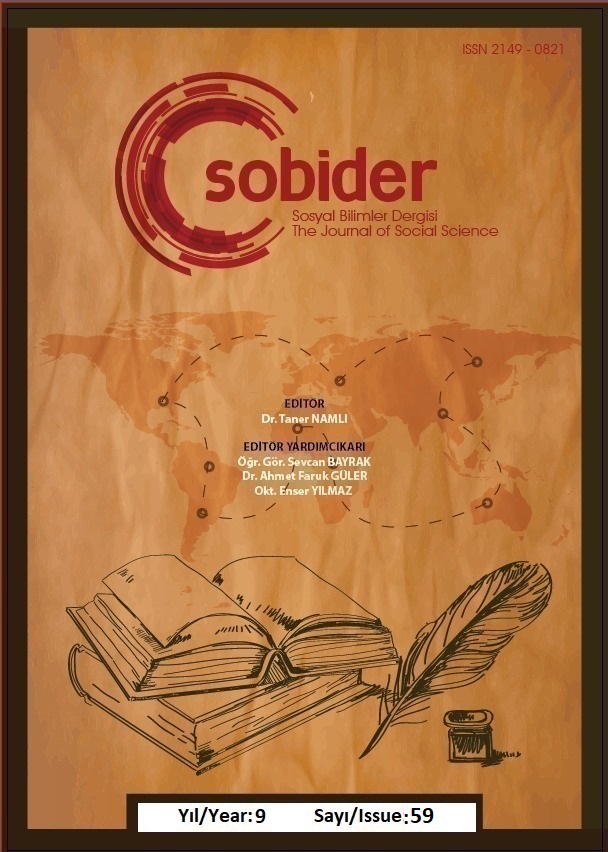COVID-19 SALGININA İÇERIDEN BAKMAK: ERZURUM DEVLET HASTANESİ’NDEKİ BİR GRUP ÇALIŞANIN SALGINI ALGILAMA VE DENEYİMLEME BİÇİMLERİ
Author :
Abstract
Covid-19 salgınından en çok etkilenen kesimlerin başında sağlık çalışanları gelmektedir. Sağlık çalışanlarının salgını nasıl algıladıkları, salgın sürecini nasıl deneyimledikleri, aile yaşamlarını nasıl etkilediği, hastane koşullarında salgınla ne şekilde mücadele ettikleri ve hastaların salgın sürecini deneyimleme biçimleri bu çalışmanın sorunsalını oluşturmaktadır. Bu sorunsal çerçevesinde, bu çalışmada, Erzurum’da 9’u kadın ve 1’i erkek olmak üzere toplamda 10 sağlık çalışanıyla nitel araştırma kapsamında derinlemesine mülakatlar yapılmıştır. Yapılan araştırma neticesinde; Covid-19 salgınının sağlık çalışanlarının aile ilişkilerini olumsuz yönde etkilediği görülmüştür. Salgının başlangıcında sağlık çalışanlarına yönelik toplumda olumlu algı ve tutumların olduğu, buna karşın salgının ilerleyen sürecinde sağlık çalışanlarının toplumsal tepkilerin hedefi haline geldikleri sonucuna ulaşılmıştır. Salgın sürecinde hastanede virüse yakalanmış yaşlı bireylerin aile ilişkilerinin zayıfladığı görülmüştür. Salgınla mücadelede alınan önlemlerin toplumda yeterince önemsenmediği, dikkat edilmediği ve basite indirgendiği anlaşılmıştır.
Keywords
Abstract
Healthcare workers are among the groups most affected by the Covid-19 pandemic. How healthcare professionals perceive the epidemic, how they experience the epidemic process, how it affects their family lives, how they fight the epidemic in hospital conditions, and how patients experience the epidemic process are the problematic of this study. In this problematic framework, in this study, in-depth interviews were conducted within the scope of qualitative research with a total of 10 healthcare workers, 9 of them female and 1 male, in Erzurum. As a result of the research; It has been observed that the Covid-19 outbreak negatively affects the family relationships of healthcare workers. It was concluded that there were positive perceptions and attitudes towards healthcare workers in the society at the beginning of the epidemic, however, healthcare workers became the target of social reactions in the progressing process of the epidemic. During the epidemic period, it was observed that family relationships of elderly individuals who were infected with the virus in the hospital were weakened. It has been understood that the measures taken in combating the epidemic are not sufficiently important, paid attention and simplified in society.
Keywords
- Akdur, R. (2006). Sağlık Sektörü Temel Kavramlar Türkiye ve Avrupa Birliği’nde Durum ve Türkiye’nin Birliğe Uyumu. Ankara: Ankara Üniversitesi Basımevi.
- Aktay, Y. (2020). “Hatirlama ve Nisyan Arasında Salgının Sosyolojik Bakiyesi ve Küreselleşme”. Küresel Salgının Anatomisi İnsan ve Toplumun Geleceği. Çev. M. Şeker, A. Özer ve C. Korkut. Ankara: Türkiye Bilimler Akademisi.
- Altunışık, R.; Çoşkun, R.; Bayraktaroğlu, S.; Yıldırım, E. (2007). Sosyal Bilimlerde Araştırma Yöntemleri: SPSS Uygulamalı. Sakarya: Sakarya Yayıncılık.
- Aytaç, Ö. ve Kurtdaş, M.Ç. (2015). “Sağlık - Hastalığın Toplumsal Kökenleri ve Sağlık Sosyolojisi”. Fırat Üniversitesi Sosyal Bilimler Dergisi, 25(1), 231-250.
- Budak, F., Korkmaz, Ş. (2020). “Covid-19 Pandemi Sürecine Yönelik Genel Bir Değerlendirme: Türkiye Örneği”. Sosyal Araştırmalar ve Yönetim Dergisi, 1, 62-79.
- Calnan, M. and Johnson, B. (1985). “Health, Health Risks and Inequalities: An Exploratory Study Of Women’s Perceptions”. Sociology of Health and Illness, 7(1), 55-75.
- Demirer, Y. (2006). “Kültür ve Siyaset Ekseninde Sağlıkta Kavramsallaştırma: Hasta ve Hastalık Örnekleri”. Toplum ve Hekim, 21(1). 25-31.
- Erdoğmuş, N. (2020). “Kovid-19 Salgını Anlam Yıkımına Mı Yoksa Yeni Bir Anlamlandırmaya Mı Yol Açacak?”, Covid-19 Salgınının Sosyolojik Analizi. Edt. L. Sunar, Toplumsal Yapı Araştırmalar Programı.
- Joseph, T. ve Ashkan, M. (2020). Internatıonal Pulmonologıst’s Consensus on Covid-19. India: Amrita Institute of Medical Sciences.
- Karakaş, M. (2020). “Covid-19 Salgınının Çok Boyutlu Sosyolojisi ve Yeni Normal Meselesi”. İstanbul Üniversitesi Sosyoloji Dergisi, 40(1): 541–573.
- Meydanlıoğlu, A. (2013). “Sağlık Çalışanlarının Sağlığı ve Güvenliği”. Balıkesir Sağlık Bilimleri Dergisi, 2(3), 192-199.
- Narter, M. (2004). “Sağlık ve Hastalığın Sosyal Temsilleri”. Psikoloji Çalışmaları, 24, 57-74.
- Oskay, Ülgen, (1993), “Medikal Sosyolojide Bazı Kavramsal Açıklamalar”, Sosyoloji Dergisi, 4, 89-140.
- Punch, K. F. (2011). Sosyal Araştırmalara Giriş: Nicel ve Nitel Yaklaşımlar, Çev. D. Bayrak, H. B. Arslan ve Z. Akyüz, Ankara: Siyasal Kitabevi Yayınları.
- Rosenthal, B. R. L., Brownstein, J. N., Rush, C. H., Hirsch, G. R., Willaert, A. M…Fox, D. J. (2010). “Community Health Workers: Part of the Solution”. Health Affairs, 29(7), 1338-1342.
- Saatçı, E. (2020). “COVID-19 Pandemisi ve Sağlık Çalışanları: Yaşatmak Mı Yaşamak Mı?”, Türk Aile Hekimler Dergisi, 24 (3): 153-166.
- Sezgin, D. (2011). Tıbbileştirilen Yaşam Bireyselleştirilen Sağlık. İstanbul: Ayrıntı, Yayınları.
- Taştan, C. (2020). “Kovid-19 Salgını ve Sonrası Psikolojik ve Sosyolojik Değerlendirmeler”. KOVİD-19 Salgını ve Sonrası Toplum, Devlet ve Küresel Sistem, Der. O. İmga ve U. Ayhan, Ankara: Polis Akademisi Yayınları.
- Tuncay, F. E., Koyuncu, E., Özel, Ş. (2020): “Pandemilerde Sağlık Çalışanlarının Psikososyal Sağlığını Etkileyen Koruyucu ve Risk Faktörlerine Ilişkin Bir Derleme”. Ankara Medical Journal, 2, 488-501.
- Yıldırım, A. ve Şimşek, H. (2005). Sosyal Bilimlerde Nitel Araştırma Yöntemleri. Ankara: Seçkin Yayınları.
- Yüncü, V. ve Yılan, Y. (2020). “COVID-19 Pandemisinin Sağlık Çalışanlarına Etkilerinin İncelenmesi: Bir Durum Analizi”. Iğdır Üniversitesi Sosyal Bilimler Dergisi, Ek Sayı, 373-401.
- Zeybekoğlu-Akbaş, Ö. ve Dursun, C. (2020). “Koronavirüs (Covid-19) Pandemisi Sürecinde Özel Alanına Kamusal Alanı Sığdıran Çalışan Anneler”, Avrasya Sosyal ve Ekonomi Araştırmaları Dergisi, 7(5). 78-94.





